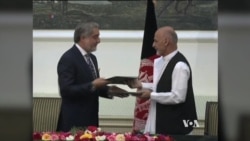Afghanistan’s newly-elected government says improved economic relations with Pakistan are a must for reducing tensions and strengthening cooperation to deal with terrorism and other challenges facing the region. Pakistani leaders say they also look forward to jointly solving problems that are straining ties.
Afghan president-elect Ashraf Ghani, a former World Bank economist, is preparing to take office Monday, at a time when political ties with Pakistan are strained over terrorism allegations and counter-allegations.
But a spokesman for the new president, Abas Noyan, said Ghani is determined to use his strong economic background to govern domestic and foreign relations, particularly with Afghanistan’s immediate neighbors such as Pakistan.
Constructive dialogue
He said the new president is determined to engage in constructive negotiations with his Pakistani counterparts.
"Dr. Ashraf Ghani and his team want a very close and brotherhood relationship with Pakistan and all neighbors. The new government and our team do not want any tension with any neighboring countries," said Noyan.
"It does not help us, the tension does not help us. We are looking forward to make a good relationship [with Pakistan]. We are looking for some joint ventures, projects in order to help each other," he said. "For example, Afghanistan has a lot of water and Pakistan lacks of energy, so how to create a common project that Pakistan gets more energy and also Afghanistan will be benefited from that project."
Pakistan is facing an acute energy and power crisis. Noyan said a strong peaceful relationship not only will ease tensions and mistrust, it also will help Afghanistan and Pakistan jointly use regional resources to make their economies independent of foreign financial assistance.
Kabul has long accused Islamabad of fueling the Taliban insurgency in Afghanistan. Afghan authorities have blamed the Pakistani military for helping insurgents in the ongoing fighting in a southern border district.
In a farewell speech outgoing Afghan President Hamid Karzai reiterated those allegations and went on to claim the United States “pursued its own interests and did not want peace in Afghanistan.”
Pakistan rejects the Afghan charges as baseless and has lately accused Afghanistan of sheltering fugitive Pakistani militants for cross-border raids against Pakistan outposts.
Bilateral coordination
Pakistan Foreign Ministry Spokeswoman Tasnim Aslam told reporters Thursday in Islamabad her country is confident bilateral ties will strengthen under the new Afghan leadership. She apparently avoided responding to Karzai’s latest allegations against Pakistan.
“We have welcomed the conclusion of [the Afghan] electoral process. We hope that with this, a new era of stability in Afghanistan will usher in, there will be pace and we have been in contact with across the board Afghan leadership and we hope and we look forward to working very closely with the new Afghan leadership to further strengthen bilateral relations between our two countries and resolve the issues of sanctuaries inside Afghanistan of terrorists and cross-border attacks,” said Aslam.
In one of his pre-election debates at the Washington-based Atlantic Council, President-elect Ghani warned that extremists on either side of the border threaten Afghanistan and Pakistan, and they endanger global peace.
“We need to envisage a 10-year process at the end of which these two countries can become pillars of regional stability and can engage in forms of cooperation and mutual cooperation that is fundamental to solving problems that cannot be solved within a single border. This is a fundamental axiom on the basis which I am going to proceed,” said Ghani.
Pakistan was one of only three countries that recognized the Taliban regime in Kabul before a U.S.-led military coalition dislodged it from power. A large number of Taliban leaders and fighters fled to neighboring Pakistan.
Afghan and American military commanders insist elements within the Pakistani spy agency maintain ties with the Taliban, even after Pakistan became a key member of the US-led anti-terrorism campaign.





